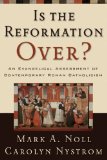Is the Reformation Over? An Evangelical Assessment of Contemporary Roman Catholicism. By Mark A. Noll and Carolyn Nystrom. Grand Rapids: Baker, 2005. 272 pp. Hardback. $24.99.
Dr. Earl Radmacher spoke with prophetic insight in 1990 when he wrote in The Journal of the Evangelical Theological Society (33:1) that Lordship Salvation was paving the road back to Rome. This truth is seen clearly in Mark Noll and Carolyn Nystrom’s book, Is the Reformation Over? An Evangelical Assessment of Contemporary Roman Catholicism.
Their book begins by providing evidence for improving relationships between Catholics and Evangelical Christians (chap 1). The next two chapters offer an overview of what has happened within Catholicism and Evangelicalism to bring these two former opponents together in peace and unity. Chapters 4–7 then provide numerous quotes and accounts from Catholic and Evangelical dialogue and joint statements which show where Catholics and Evangelicals agree, and where there are still differences. The final two chapters are the authors’ personal assessment of how things now stand in regard to the Reformation.
And here, essentially, is their conclusion: “If it is true …that…justification is the article on which the church stands or falls, then the Reformation is over” (p. 232). They get to this conclusion by showing that although there are numerous areas where Catholics and Evangelicals do not agree—such as the papacy, the Virgin Mary, sacraments, and mandatory celibacy of priests (p. 233)—with regard to the pivotal doctrine of justification (p. 140), Catholics and Evangelicals now believe the same thing.
To begin with, the famous ECT (Evangelicals and Catholics Together) dialogues affirmed that:
By faith, which is also the gift of God, we repent of our sins and freely adhere to the gospel, the good news of God’s saving work for us in Christ. …Faith is not merely intellectual assent but an act of the whole person, involving the mind, the will, and the affections, issuing in a changed life. We understand that what we here affirm is in agreement with what the Reformation traditions have meant by justification by faith alone (sola fide) (p. 160).
But not all Reformed people accepted ECT. Knowing this, Noll and Nystrom go on to state numerous other examples of joint statements by Catholics and Evangelicals. For example, a joint document issued by Reformed Baptists and Catholics contains the following statement on salvation:
Conversion is turning away from all that is opposed to God, contrary to Christ’s teaching, and turning to God, to Christ, the Son, through the work of the Holy Spirit. It entails a turning from the self-centeredness of sin to faith in Christ as Lord and Savior. Conversion is a passing from one way of life to another new one, marked with the newness of Christ. It is a continuing process so that the whole life of a Christian should be a passage from death to life, from error to truth, from sin to grace. Our life in Christ demands continual growth in God’s grace. Conversion is personal but not private. Individuals respond in faith to God’s call, but faith comes from hearing the proclamation of the word of God and is to be expressed in the life together in Christ that is the church (p. 89).
Aside from the word process, most people in the Lordship Salvation camp would probably agree with this statement. Reformed Baptists and Catholics go on to write that “Justification by faith brings with it the gift of sanctification, which can grow continuously as it creates life, justice and liberty” (p. 90). Few Lordship Salvation proponents would disagree with this.
So here is the logic of Noll and Nystrom: Today, both Catholics and most Evangelicals agree that justification which is genuine will begin by faith and manifest itself through a life of good works. While many doctrines still separate and divide Catholic and Evangelical theology, Luther’s cry of sola fide is not one of them. Since the central rallying cry of the Reformation was sola fide, and there is agreement on this central point, the Reformation is indeed over.
What Noll and Nystrom fail to recognize is that the Reformation has not succeeded, but has been reversed. Only in that sense is the Reformation “over.” The Reformation began as an attempt to reform the Catholic Church, and although the RCC has softened over the years, it has not changed. Instead, Reformed and Arminian theologies have simply returned to Roman Catholic theology. All three systems require works from believers for entrance into heaven. Though all three say that Jesus Christ has done all that is necessary, and salvation is by faith alone, all three also say that if a person does not have the necessary works which accompany justification, then that person’s faith was spurious, and they are yet in their sins. Unless the person repents and has the fruit which accompanies salvation, they will not get into heaven.
Noll and Nystrom put it this way: “Catholics and evangelicals now affirm that a God-honoring, Scripture-based, and orthodox theology of justification by faith is found where the following two propositions are believed separately and together: (1) Salvation is an absolutely free gift from God. (2) There is no Christian salvation that is not manifest in good works” (p. 232).
I recommend this book. It contains a wealth of material showing how Catholics and Evangelicals are in basic agreement on justification. This should spur us on to fighting for the absolutely free offer of justification by faith alone in Christ alone. If the Reformation is indeed over, a new Reformation is needed.
Jeremy Myers
Associate Editor
Journal of the Grace Evangelical Society
Irving, TX

